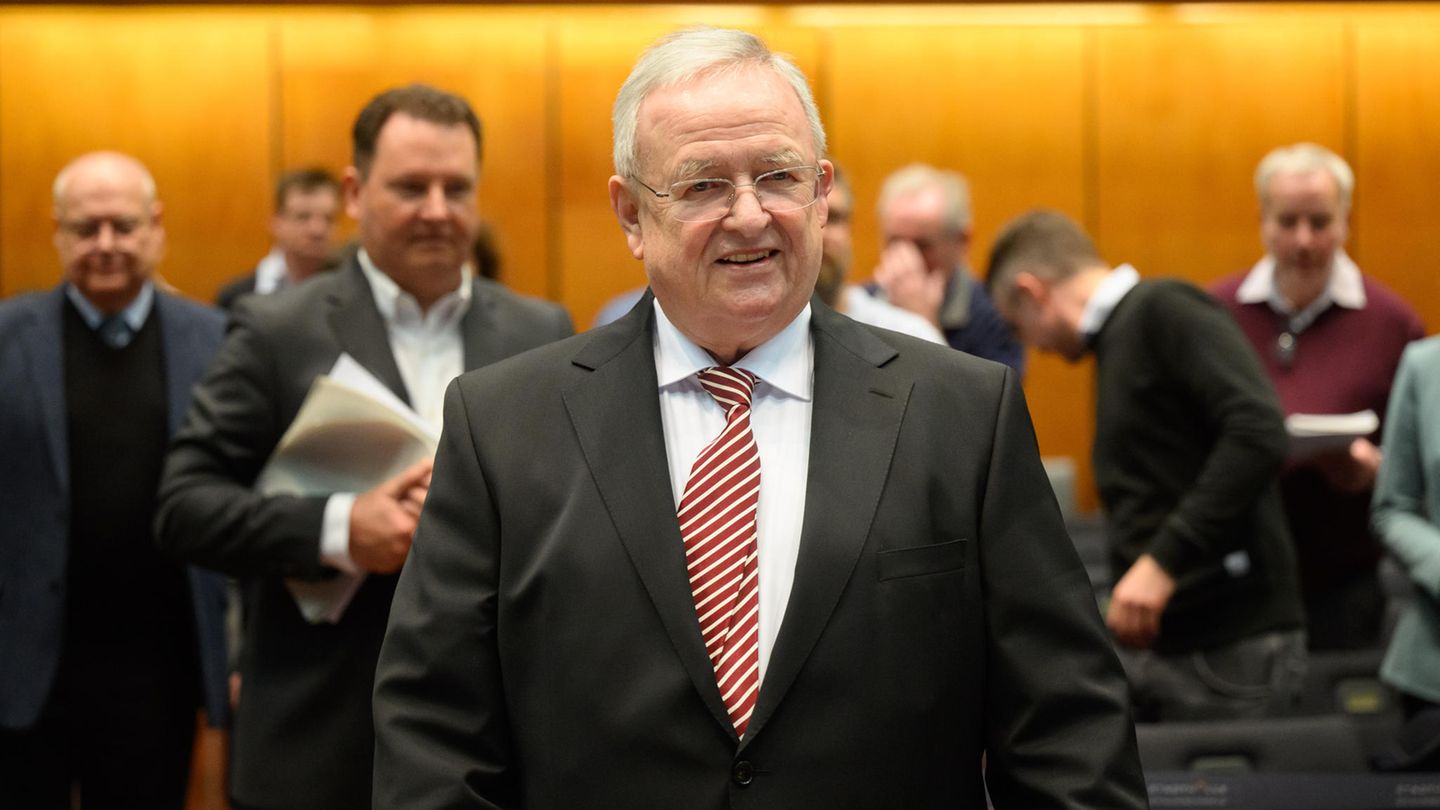On site
The diesel scandal not only damaged Volkswagen drivers, but also the company’s shareholders. They want money back and sue. During the trial, ex-VW boss Martin Winterkorn denied responsibility.
This article is adapted from the business magazine Capital and is available here for ten days. Afterwards it will only be available to read at again. Capital belongs like that star to RTL Germany.
The Congress Hall of the Braunschweig town hall is full: Where concert-goers usually listen to classical music, this Wednesday morning there are critical-looking journalists and even more critical-looking shareholders of Volkswagen AG. You don’t listen to a violin or harp, but to the deep voice of the most prominent guest that day: ex-VW CEO Martin Winterkorn.
The man who led the world’s largest automobile company for eight years may have aged a bit. The tie is slightly out of place, but the black suit fits. At 76, the manager who was costed his job by the diesel scandal in 2015 does not seem broken or mild with age. He calmly answers the questions of the person sitting opposite him on a raised platform: Christian Jäde. The judge and vice president at the Braunschweig Higher Regional Court must decide whether the lawsuit filed by thousands of VW investors against the car company will be successful and whether they will be right.
Winterkorn denies allegations in the diesel scandal
After Jäde’s instructions, Winterkorn makes an opening statement. It quickly becomes clear: He didn’t come to be remorseful – or to prove his good memory. Winterkorn denies knowing about the emissions manipulation of the VW diesel. “I was not involved in the development of the switching function, neither demanded nor encouraged it or even tolerated its use.” The prosecutor’s allegations are “inaccurate.”
Jäde is trying to surround Winterkorn, it seems. He presents documents that are intended to indicate that the ex-manager could have known about the first ideas for reducing emissions as early as 2000. Jäde wants to know to what extent Winterkorn was familiar with the details of the manipulation software. “I don’t remember exactly that time – it was a long time ago,” says witness Winterkorn. He is pursuing a strategy that his two successors, Matthias Müller and Herbert Diess, have already used. They also had memory gaps that were worrying for top managers.
Winterkorn in court: “I’m seeing this letter for the first time”
After a first short break, the mood in the hall seems to change. Judge Jäde now presents things more clearly; from now on, witness Winterkorn always begins his submissions with “Mr. Chairman”. This may be intended to seem polite or humble to the court, but it won’t improve his memory.
Jäde presents a letter from the automotive supplier Bosch to VW from 2008. This is where the symbolic word of the diesel scandal is used for the first time: Defeat Device – the English term for the defeat device that VW used to reduce the emissions levels of its diesel engines. “Does this term mean anything to him?” asks Jäde towards the witness bench. “I’m seeing this letter for the first time,” says Winterkorn. He had also never heard the term before until the scandal became known on September 18, 2015. It seems as if Winterkorn’s voice breaks when he utters this fateful date for his professional life.
Some spectators on the investor side keep shaking their heads or whispering to each other. Some of them seem spiteful to see Winterkorn in this “cross-examination”, others just listen with interest. In fact, he still has a kind of working-class charm about him. Some of his sometimes dry answers even cause giggles in the room.
It’s a model lawsuit worth billions
In Braunschweig today we are dealing with exactly this aspect. A procedure is underway under the Capital Investor Model Procedure Act (KapMuG). This enables investors to collectively assert claims for damages in Germany. This mammoth trial against VW has been running since 2018.
Deka Investment, as the savings banks’ fund house, is a model plaintiff and represents investors who are demanding billions in damages due to price losses. They are said to have suffered this after the scandal was uncovered. The defendants are Volkswagen AG and the umbrella holding company Porsche SE.
In this case, no one expects a quick result anymore. The proceedings are expected to last for a longer period of time and could have far-reaching effects on the companies involved.
The course of the diesel scandal
From 2007 to 2015, Winterkorn was CEO of Volkswagen AG – longer than only Heinrich Nordhoff, who founded the company in the 1940s. Winterkorn had a significant influence on the company; it was not for nothing that he was called “Mr. Volkswagen”. In 2015, his career with the car manufacturer came to an abrupt end: On September 18, 2015, the US Environmental Protection Agency (EPA) publicly accused the company of fraud. VW manipulated emissions values.
When the stock market reopened after the EPA’s announcement, the VW share price plummeted. Thousands of investors lost millions of euros. Five days later, Winterkorn resigned. The background and consequences of the manipulation went down in history as the diesel scandal. Winterkorn’s first public appearance in years now adds another chapter.
Source: Stern




